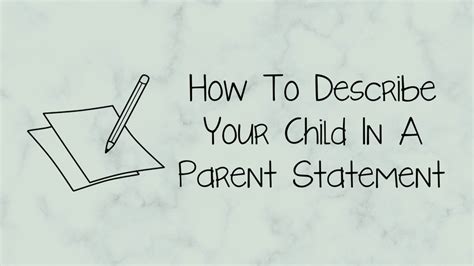Introduction
Effective communication is crucial for fostering healthy and meaningful relationships between parents and children. Parent statements play a pivotal role in shaping these interactions and conveying parental expectations, guidance, and support. This comprehensive article provides a diverse array of parent statement samples that cover various situations and age groups. By exploring these examples, parents can gain valuable insights into crafting clear, supportive, and age-appropriate messages that promote positive child development.

Parent Statement Samples for Different Situations
1. Setting Boundaries and Expectations
- “We expect you to be home by 10 pm every night. This curfew is in place to ensure your safety and well-being.”
- “It’s important to complete your homework before using your electronic devices. Prioritizing your studies is essential for your academic success.”
2. Disciplining Children
- “I understand that you’re upset, but it’s not okay to hit your siblings. You need to find a more appropriate way to express your anger.”
- “We’re disappointed that you didn’t clean your room as agreed. As a consequence, you’ll lose your screen time for the rest of the day.”
3. Praising Children
- “I’m so proud of you for working hard on your science project. Your perseverance and creativity are inspiring.”
- “You were incredibly helpful in setting the table for dinner. Thank you for contributing to the household.”
4. Expressing Love and Support
- “I love you unconditionally. You are always welcome to talk to me about anything.”
- “I believe in you and your abilities. Know that I’m always here to support and encourage you.”
5. Guiding Children Through Challenges
- “I understand that moving to a new school can be scary. Let’s talk about your fears and develop strategies to help you feel more comfortable.”
- “It’s okay to make mistakes. The important thing is to learn from them and try again.”
Age-Appropriate Considerations
1. Preschoolers (3-5 years)
- Use simple and direct language that is easy for young children to understand.
- Focus on establishing basic rules and expectations.
- Provide positive reinforcement and praise frequently.
2. School-Aged Children (6-12 years)
- Gradually increase the length and complexity of your statements.
- Reason with children and explain the consequences of their actions.
- Encourage children to express their opinions and ask questions.
3. Teenagers (13-18 years)
- Respect teenagers’ independence and privacy.
- Use active listening and empathy to understand their perspectives.
- Set clear boundaries and expectations while allowing for some flexibility.
Common Mistakes to Avoid
- Using Negative Language: Avoid using blaming, critical, or accusatory language.
- Inconsistency: Be consistent in your expectations and discipline.
- Overreacting: Stay calm and avoid emotional outbursts.
- Ignoring Children: Pay attention to what your children say and provide meaningful responses.
- Undermining Your Partner: Avoid criticizing or contradicting your partner in front of your children.
FAQs
1. What are the most important qualities of effective parent statements?
- Clarity, support, age-appropriateness, consistency, and respect.
2. How can I respond to children who argue or resist my statements?
- Stay calm, listen actively, present your reasoning, and offer alternative solutions or consequences.
3. How can I encourage children to internalize my statements and values?
- Model your own behavior, provide positive reinforcement, and create a supportive and nurturing environment.
4. What are some creative ways to generate new parent statement ideas?
- Use a “mind-mapping” technique to brainstorm possibilities.
- Consult with a family therapist, educational expert, or parenting book.
- Observe how other parents communicate with their children and adapt ideas that resonate with you.
Conclusion
Parent statements are powerful tools that can shape the lives of children. By utilizing the examples and strategies outlined in this article, parents can foster positive and productive relationships with their children. Remember to communicate with clarity, support, and age-appropriateness, while avoiding common pitfalls. By consistently applying these principles, parents can create a foundation for healthy child development and lasting family bonds.
Additional Resources
- Positive Discipline: The Best Way to Raise Responsible, Respectful Children
- The American Academy of Pediatrics: Parent Communication
- The Gottman Institute: The 7 Principles for Making Marriage Work
